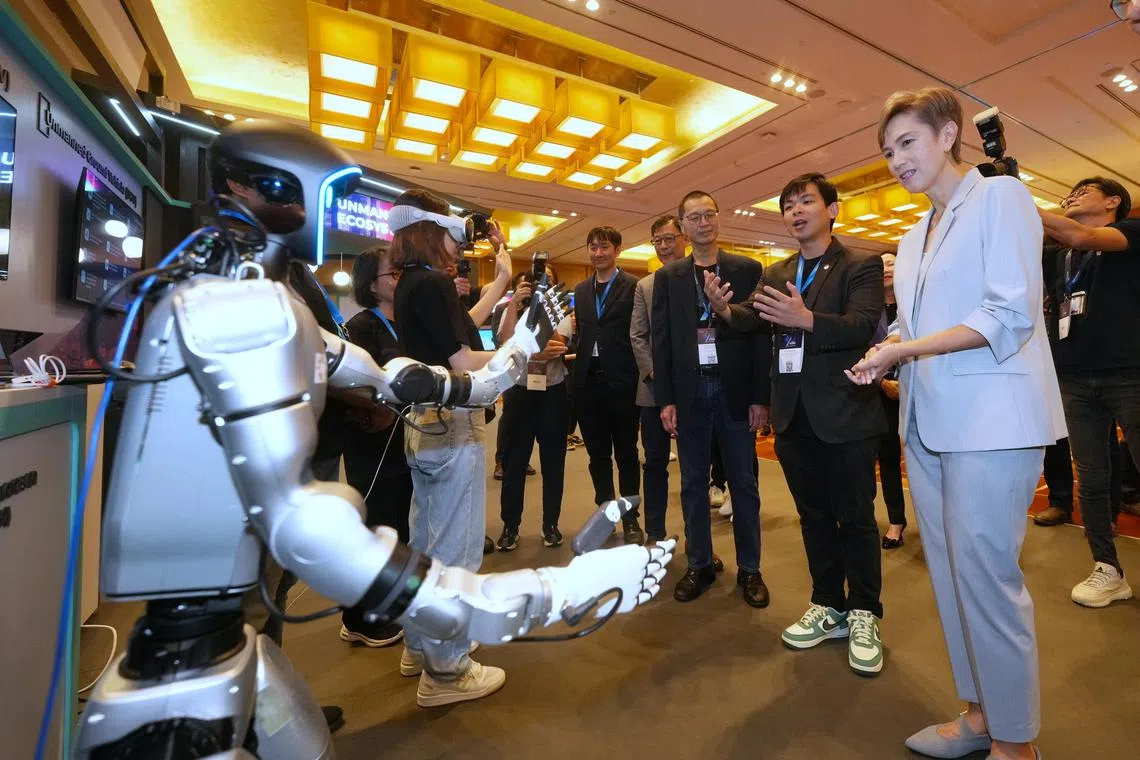Thousands of ST Engineering engineers, project managers to be upskilled as ‘bilingual’ AI talent
Sign up now: Get ST's newsletters delivered to your inbox

Minister for Digital Development and Information Josephine Teo (right) at the company’s InnoTech Conference at Marina Bay Sands Expo and Convention Centre on Sept 4.
PHOTO: LIANHE ZAOBAO
SINGAPORE – In line with the Government’s call to develop a workforce fluent in AI
The company said on Sept 4 that these employees will receive intermediate-level training at its own digital academy and at specialist institutes such as the National University of Singapore.
The workers will be effectively “bilingual”, given that they have expertise in their domain and the know-how to use AI to work more efficiently, said Minister for Digital Development and Information Josephine Teo in a speech on the same day.
She was speaking at ST Engineering’s InnoTech Conference, held at Marina Bay Sands Expo and Convention Centre, to an audience of business leaders and government officials.
An example of such bilingualism would be how ST Engineering’s space engineers are picking up AI skills to improve their work of building satellites and launching them into space for haze and weather monitoring.
“(They) know how a satellite should be designed and tested to optimise its power efficiency, weight and reliability, among other factors,” said Mrs Teo, equating each worker’s domain expertise to their mother tongue, a language they have known for a long time.
“This new language is opening up another world of knowledge and opportunities for them. For example, they are using AI to optimise the structural layouts of satellites and efficiently test thousands of design permutations.”
Singaporeans are already attempting to become fluent in the language of AI, with the country having the highest per capita ChatGPT usage globally, according to OpenAI’s data.
“Using AI tools like ChatGPT is like listening to AI to get a sense of how it sounds,” said Mrs Teo. However, she added that listening is not enough to gain fluency.
“We need opportunities to speak the language and learn from our mistakes.”
During the National Day Rally on Aug 17, Prime Minister Lawrence Wong said using AI to raise productivity and create new value in the economy is a game changer
“AI is not just for the big players,” he said, noting that AI will be a defining technology of this time.
Three out of four workers are already using AI tools in their work regularly, according to the 2025 edition of the Singapore Digital Economy Report, which will be released by the Infocomm Media Development Authority (IMDA) soon, said Mrs Teo. These tools include popular AI coding assistant Cursor, which is used by software engineers.
The Government will continue to help businesses and people go beyond listening to master the language of AI, said Mrs Teo.
Apart from the 4,000 bilingual AI workers, ST Engineering said it will also look to get 1,000 AI specialists in the next few years.
They will come from external hires and upskilling existing employees through programmes such as IMDA’s TechSkills Accelerator, a flagship training initiative for digital skills that has trained 340,000 individuals since its launch in 2016.
“These specialists will be looking at open-source models to customise and deploy them to suit our specific applications,” said Dr Lee Shiang Long, ST Engineering’s group chief technology and digital officer.
“They will also be focused on developing agentic AI systems and cyber-security measures to protect AI systems.”
AI practitioners and bilingual AI workers will work together to be a formidable team, said Mrs Teo, who added that she has heard from data specialists in particular about the value of inputs from colleagues in other departments and functions.
“In manufacturing, for example, the process engineers know the detailed workflows. The technicians know when and how maintenance must be carried out,” she said.
“Without them, the data scientist will be hard-pressed to produce meaningful business improvements.”



